六年级英语:情态动词练习题
专题11 重点语法知识梳理:情态动词及专练60题(解析版)-六年级英语下学期期末考点大串讲

专题11 重点语法知识梳理三:情态动词及专练60题(解析版)Ⅰ.情态动词一、概论情态动词是一种特殊的助动词,具有下列特征:1. 情态动词具有一定的词义,能表达某种看法;如:can能,may可以,must必须,need需要,等等;2. 情态动词不能单独作谓语,只能和实义动词的原形一起构成复合谓语;如:You can stay here before 5:00 o’clock. 你可以在这呆到五点钟。
We must have a talk right now. 我们现在就必须谈谈。
3. 情态动词无人称变化,即任何事物做主语对情态动词来讲都无变化。
但是情态动词有时态变化。
时态变化会在以后分单词讲解,此处仅以can为例,看看人称对情态动词是否无影响:如:I can dance very well.我舞跳得很好。
He can play basketball pretty well.他篮球打得很好。
I know you can play the piano fairly well.我知道你钢琴弹得很棒。
They all can swim quite well.他们游泳游得相当好。
二、常见的情态动词1.can/can’t,能够/不能① 表示"能、会",指脑力或体力方面的"能力"。
例如:Jim can swim but I can't.吉姆会游泳,但我不会。
① 表示"可能",常用于否定句或疑问句中,指某种可能性。
例如:Han Mei can't be in the classroom.韩梅不可能在教室里。
Can he come here today,please?请问他今天能到这里来吗?① 表示"可以",常用于口语中,指许可或请求做某事。
例如:Can I have a cup of tea,please?请问我可以喝一杯茶吗?You can go out.你可以出去了?① 否定句型为: 主语+c an not(can't/cannot)+动词原形+其它。
(六年级)情态动词can与there_be句型练习

一、情态动词can 的相关练习。
1)你会溜冰吗?1)______ you ________? 2)-----Can I go now? ----- Yes,_____________. / No, ____________.3) 露西不可能在教室里面。
Lucy _______ be in the classroom.4) 这可能是真的吗?_____ this_____ true?5)他不可能超过60岁。
He _______ be over sixty.二、there be句型练习1. 将下列句子变成否定句和一般疑问句。
1). There is some water in the bottle.否定句:____________________________________________________疑问句:____________________________________________________2). There are many apples in the box.否定句:____________________________________________________疑问句:____________________________________________________3). There is a book and a pen on the desk.否定句:____________________________________________________疑问句:____________________________________________________4). There are a lot of children in the park.否定句:____________________________________________________疑问句:____________________________________________________三. 用恰当的be动词填空。
六年级英语动词试题答案及解析
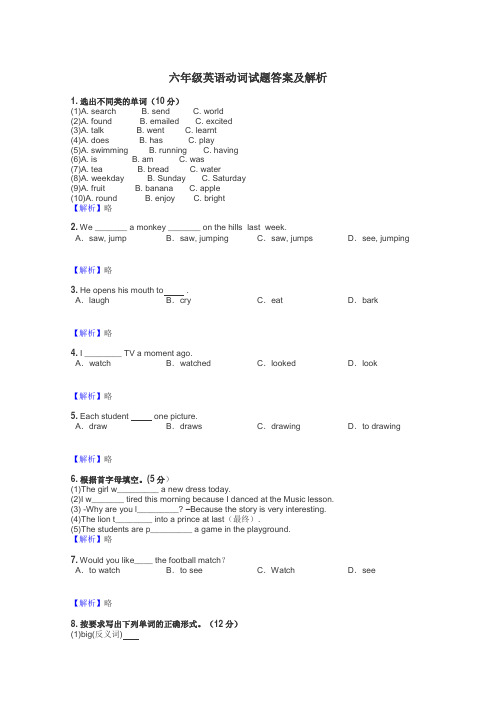
六年级英语动词试题答案及解析1.选出不同类的单词(10分)(1)A. search B. send C. world(2)A. found B. emailed C. excited(3)A. talk B. went C. learnt(4)A. does B. has C. play(5)A. swimming B. running C. having(6)A. is B. am C. was(7)A. tea B. bread C. water(8)A. weekday B. Sunday C. Saturday(9)A. fruit B. banana C. apple(10)A. round B. enjoy C. bright【解析】略2. We _______ a monkey _______ on the hills last week.A.saw, jump B.saw, jumping C.saw, jumps D.see, jumping【解析】略3. He opens his mouth to .A.laugh B.cry C.eat D.bark【解析】略4. I ________ TV a moment ago.A.watch B.watched C.looked D.look【解析】略5. Each student one picture.A.draw B.draws C.drawing D.to drawing 【解析】略6.根据首字母填空。
(5分)(1)The girl w_________ a new dress today.(2)I w_______ tired this morning because I danced at the Music lesson.(3) -Why are you l_________? –Because the story is very interesting.(4)The lion t________ into a prince at last(最终).(5)The students are p_________ a game in the playground.【解析】略7. Would you like____ the football match?A.to watch B.to see C.Watch D.see【解析】略8.按要求写出下列单词的正确形式。
六年级英语下册语法特训5情态动词must(含答案)译林版三起

语法特训5:情态动词must〔含答案〕一、must和can辨析must和can都是情态动词。
情态动词不能单独使用,必需与其后的动词共同构成谓语,其后接动词原形。
情态动词本身没有人称和数的变化。
1.must表示必需,否认时表示禁止,语气比拟剧烈。
例如:You must finish your homework now.你现在必需完成家庭作业。
You mustn't cross the road now.你现在不能过公路。
2.must也可以表示说话人的主观推想。
例如:It's seven o'clock.Tom must be at home.现在七点钟。
汤姆确定在家。
3.can通常表示力量〔体力、学问、技能〕,或表示恳求和允许。
例如:The robot can talk.这个机器人能说话。
You can get there by bus.你可以乘公共汽车到那儿。
Can I have some water?我能喝一些水吗?二、must的根本句型1.确定句结构主语十must十动词原形〔十其他〕。
例如:I must spell these new words.我必需拼写这些生词。
2.否认句结构主语十must十not十动词原形〔十其他〕。
must not=mustn't。
例如:You must not/mustn't smoke here.你不能在这里吸烟。
3.一般疑问句结构Must十主语十动词原形〔十其他〕?例如:Must I clean all the rooms?我必需清扫全部的房间吗?Yes, you must./No, ,你必需〔清扫〕。
/不,你不必(清扫)。
留意:must开头的一般疑问句,假设作否认答复,应用needn't或don't have to,而不用mustn't (由于mustn't表示禁止,意为“绝不能〞;而否认答复是想表示没有必要,不是绝不能做某事,所以否认答复用needn't或don't have to)。
小学修改情态动词分类练习(含答案)

小学修改情态动词分类练习(含答案)一、请根据句意,选择合适的情态动词填空。
1. 你______帮我一下吗?我不能搬这个箱子。
(能)2. 明天是周末,你______去公园玩吗?(会)3. 我们______一起去购物吧!(应该)4. 她想去看电影,但是她______去,因为她有很多事情要做。
(不能)5. 你______告诉我这个秘密吗?我能保守秘密的。
(可以)二、请根据句意,修改下列句子中的情态动词。
1. 我能帮你拿行李。
(修改为“我可以帮你拿行李。
”)2. 你应该吃早饭。
(修改为“你应该要吃早饭。
”)3. 他能参加我们的聚会。
(修改为“他可以参加我们的聚会。
”)4. 你得好好努力研究。
(修改为“你必须好好努力研究。
”)5. 我可以陪你玩游戏。
(修改为“我能陪你玩游戏。
”)三、请给下列句子中的情态动词分类。
1. 我可以去图书馆借书。
(自由意愿)2. 你应该好好研究才能取得好成绩。
(建议)3. 他能在音乐比赛中表现得很出色。
(能力)4. 这个问题太难了,我不能回答。
(限制)5. 你会游泳吗?(能力)答案:一、1. 能;2. 会;3. 应该;4. 不能;5. 可以二、1. 我可以帮你拿行李。
2. 你应该要吃早饭。
3. 他可以参加我们的聚会。
4. 你必须好好努力研究。
5. 我能陪你玩游戏。
三、自由意愿:1. 我可以去图书馆借书。
建议:2. 你应该好好研究才能取得好成绩。
能力:3. 他能在音乐比赛中表现得很出色;5. 你会游泳吗?限制:4. 这个问题太难了,我不能回答。
六年级英语情态动词单选题60题
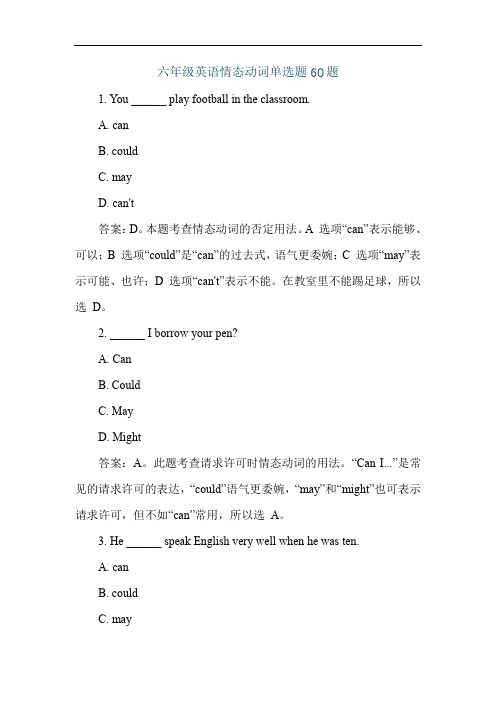
六年级英语情态动词单选题60题1. You ______ play football in the classroom.A. canB. couldC. mayD. can't答案:D。
本题考查情态动词的否定用法。
A 选项“can”表示能够、可以;B 选项“could”是“can”的过去式,语气更委婉;C 选项“may”表示可能、也许;D 选项“can't”表示不能。
在教室里不能踢足球,所以选D。
2. ______ I borrow your pen?A. CanB. CouldC. MayD. Might答案:A。
此题考查请求许可时情态动词的用法。
“Can I...”是常见的请求许可的表达,“could”语气更委婉,“may”和“might”也可表示请求许可,但不如“can”常用,所以选A。
3. He ______ speak English very well when he was ten.A. canB. couldC. may答案:B。
这里说的是过去的能力,“could”是“can”的过去式,A 选项“can”用于现在的能力,C 选项“may”和D 选项“might”都不表示能力,所以选B。
4. You ______ be careful when you cross the road.A. canB. couldC. mayD. must答案:D。
本题强调过马路时必须小心,“must”表示必须,A 选项“can”表示能够,B 选项“could”是“can”的过去式,C 选项“may”表示可能,均不符合题意,所以选D。
5. ______ I come in?A. CanB. CouldC. MayD. Must答案:C。
“May I come in?”是常见的进入房间前的请求用语,A 选项“Can”也可用于请求,但不如“May”礼貌,B 选项“Could”语气更委婉,D 选项“Must”表示必须,不符合请求的语境,所以选C。
小学六年级英语情态动词单项选择题30道
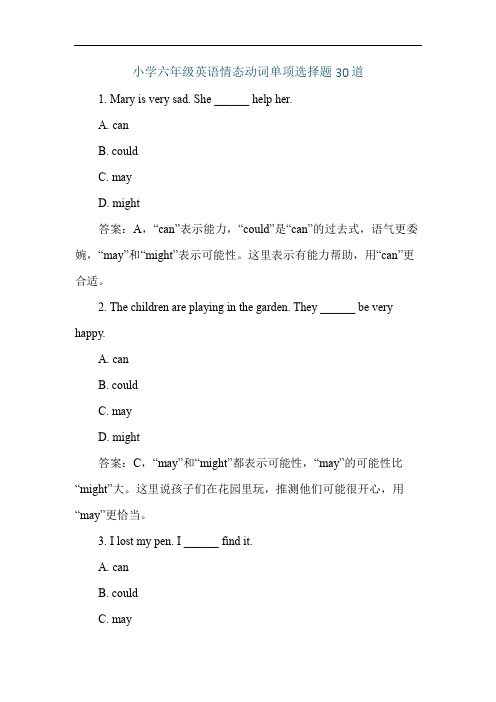
小学六年级英语情态动词单项选择题30道1. Mary is very sad. She ______ help her.A. canB. couldC. mayD. might答案:A,“can”表示能力,“could”是“can”的过去式,语气更委婉,“may”和“might”表示可能性。
这里表示有能力帮助,用“can”更合适。
2. The children are playing in the garden. They ______ be very happy.A. canB. couldC. mayD. might答案:C,“may”和“might”都表示可能性,“may”的可能性比“might”大。
这里说孩子们在花园里玩,推测他们可能很开心,用“may”更恰当。
3. I lost my pen. I ______ find it.A. canB. couldC. may答案:A,“can”强调有能力做某事,这里表示有找到笔的能力。
4. Tom is ill. He ______ come to school today.A. can'tB. couldn'tC. may notD. might not答案:A,“can't”表示不能,“couldn't”是过去式,“may not”和“might not”表示可能不。
这里说汤姆病了,所以今天不能来学校,用“can't”。
5. We have a party at home. You ______ come if you want.A. canB. couldC. mayD. might答案:A,“can”表示许可,这里说如果你想来家里的派对是被许可的,用“can”。
6. The exam is very difficult. I ______ pass it.A. canB. couldC. may答案:C,“may”表示有可能,这里说考试很难,有可能通过,用“may”。
小学五六年级 情态动词专项练习
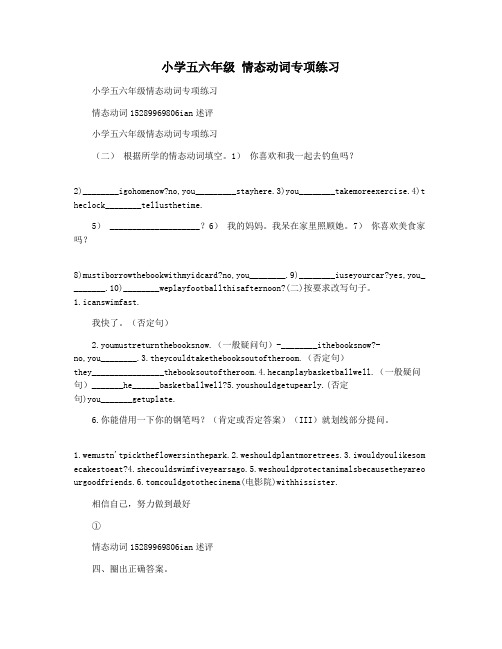
小学五六年级情态动词专项练习小学五六年级情态动词专项练习情态动词152********ian述评小学五六年级情态动词专项练习(二)根据所学的情态动词填空。
1)你喜欢和我一起去钓鱼吗?2)________igohomenow?no,you_________stayhere.3)you________takemoreexercise.4)t heclock________tellusthetime.5) ____________________?6)我的妈妈。
我呆在家里照顾她。
7)你喜欢美食家吗?8)mustiborrowthebookwithmyidcard?no,you________.9)________iuseyourcar?yes,you_ _______.10)________weplayfootballthisafternoon?(二)按要求改写句子。
1.icanswimfast.我快了。
(否定句)2.youmustreturnthebooksnow.(一般疑问句)-________ithebooksnow?-no,you________.3.theycouldtakethebooksoutoftheroom.(否定句)they________________thebooksoutoftheroom.4.hecanplaybasketballwell.(一般疑问句)_______he______basketballwell?5.youshouldgetupearly.(否定句)you_______getuplate.6.你能借用一下你的钢笔吗?(肯定或否定答案)(III)就划线部分提问。
1.wemustn'tpicktheflowersinthepark.2.weshouldplantmoretrees.3.iwouldyoulikesom ecakestoeat?4.shecouldswimfiveyearsago.5.weshouldprotectanimalsbecausetheyareo urgoodfriends.6.tomcouldgotothecinema(电影院)withhissister.相信自己,努力做到最好①情态动词152********ian述评四、圈出正确答案。
六年级英语情态动词单选题60题
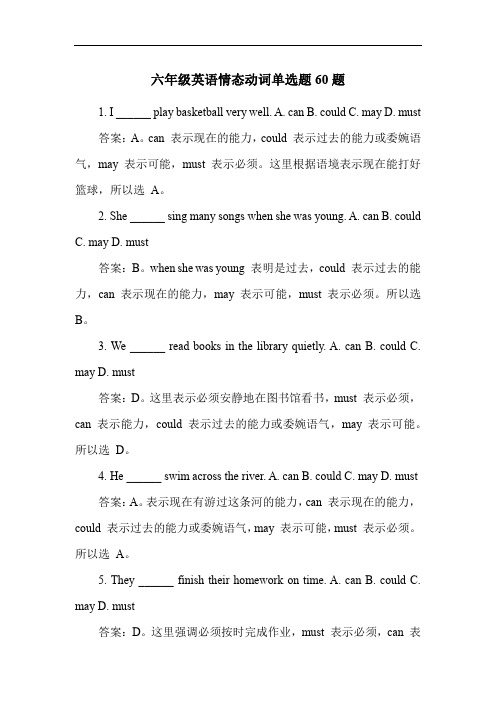
六年级英语情态动词单选题60题1. I ______ play basketball very well. A. can B. could C. may D. must答案:A。
can 表示现在的能力,could 表示过去的能力或委婉语气,may 表示可能,must 表示必须。
这里根据语境表示现在能打好篮球,所以选A。
2. She ______ sing many songs when she was young. A. can B. couldC. mayD. must答案:B。
when she was young 表明是过去,could 表示过去的能力,can 表示现在的能力,may 表示可能,must 表示必须。
所以选B。
3. We ______ read books in the library quietly. A. can B. could C. may D. must答案:D。
这里表示必须安静地在图书馆看书,must 表示必须,can 表示能力,could 表示过去的能力或委婉语气,may 表示可能。
所以选D。
4. He ______ swim across the river. A. can B. could C. may D. must答案:A。
表示现在有游过这条河的能力,can 表示现在的能力,could 表示过去的能力或委婉语气,may 表示可能,must 表示必须。
所以选A。
5. They ______ finish their homework on time. A. can B. could C. may D. must答案:D。
这里强调必须按时完成作业,must 表示必须,can 表示能力,could 表示过去的能力或委婉语气,may 表示可能。
所以选D。
6. I ______ ride a bike when I was six. A. can B. could C. may D. must答案:B。
牛津上海版六年级第一学期 情态动词+连词专项讲解课后练习(有答案)

牛津上海版六年级第一学期情态动词+连词专项讲解课后练习(有答案)Ⅰ. Choose the best answer (选择)1.We must listen to our teacher in ______ class.A. aB. anC. theD. /2.Anyone who _____ the rules must be punished.(惩罚)A. breaks B, breaking C. broke D. break3.Must I _____ the lift up to the fifty-fifth floor?A. getB. takeC. haveD. make4.We don't think it's safe to ______ the road.A. go roundB. get throughC. walk intoD. run across5.Let me ______ you about myself.A. say toB. talk toC. speakD. tell to6.Tom and Jack, _______ talk noisily here.A. mustn'tB. can'tC. don'tD. won'tst night, his parents ______ him at home alone watching TV.A. leaveB. leavesC. leftD. leaf8.At lunchtime we can eat nice food in a _______ .A. schoolB. hospitalC. shopD. restaurant9.---- Which T-shirt would you like?----- The one ______ the right, with a V-neck.A. onB. ofC. inD. by10.Today, for many people, lunch is a quick _______.A. foodB. restC. mealD. joyⅡ. Complete the sentences with the given words in their proper forms.(用所给单词的适当形式填空)1.It's dangerous ______ (chase) each other in the corridor.2.We promise we must be honest ______ (child)3.Tom _______ (park) his car and entered the supermarket.4.After three weeks' holiday, I put on more ______ (weigh).5.As a young boy, I was good at swimming and ______ (climb) trees.6.I can't tell whole ______ (sign) it is on the paper..Ⅲ.Rewrite the sentences as required(按要求改写句子)1.Don't talk big. (句意不变)You ______ _______ big.2.We have rules in 0ur classroom.(改为否定句)We _____ _______ rules in our classroom.3.The sign on the roadside means "No camera!". (对划线部分提问)______ _______ the sign on the roadside mean?4.The building behind the school is an indoor swimming trining centre.(对划线部分提问)_______ _______ is an indoor swimming training centre?5.We must use the llift to reach the top floor.(一般疑问句)______ we ______ the lift to reach the top floor?Ⅳ. Choose the words or expressions and complete the passage.A.True or False(判断下列句子是否符合短文意思,符合用“T”表示,不符合用“F”表示)( ) 1. You can find these rules in a library.( ) 2. You can use your friend’s card to borrow books.( ) 3. You mustn’t draw on the books.( ) 4. You can leave the book on the table after you read them.( ) 5. You can’t buy food or drink in the room so you must bring some with you.B. Choose the best answer(根据短文内容,选择最恰当的答案)Today people can use the phone to talk with others almost 1 on the earth. But when you use the phone, you can't 2 the person you are talking with. That situation(情况)may be changed in the near future.Today some people are using a kind of telephone. It's 3 the picture phone. With it, two people who are talking can see each other.Picture phones are very useful. When you have something to 4 someone you may use the picture phone. If the person you're calling has the 5 phone he will see the picture. Or you may be able to go shopping through your picture phone. You'll be able to shop all over Garden City and even 6 leave your room!1. A. every where B. somewhere C. anywhere D. some place2. A. listen B. see C. look D. watch3. A. called B. name C. with D. has4. A. give B. show C. send D. make5. A. other B. different C. mobile D. same6. A. never B. ever C. if D. stillC.Read the passageand fill in the blanks with proper words.(在短文的空格内填入适当的单词,使其内容通顺,每空填一词,首字母已给出)Our school held a Lantern Festival a few weeks ago. I enjoyed it very much. We watched lanterns of different sizes, c_____ and shapes. It is interesting for us to Apples are the best fruit!Apples come in tcolours. Apples can be red, yellow or green. Lots of other fruits come in only one colour, like oranges. An orange can only be o!Apples make the best snack (零食) . Apples are crisp (脆) and s. You can bite right into an apple and enjoy iright away. You can't just bite into an orange. You have to peel oranges first. They get so sticky and messy.Apples can be made into l of other foods. An apple can be made into a pie.An orange can be made into a cake. But oranges are mostly just made into orange juice.D.Fill in the blanks about the story(阅读短文,填空,每线词数不限)John was nine years old, and he was a very naughty boy. But his mother always said that he would become a good boy someday. Then one day, after he came home from school, John’s teache r called his mother on the phone and said, ‘Did you know, Mrs Perkings, that John savedanother boy when he fell into the river while we were out for a walk this morning?’Mrs Perking was very happy when she heard this. She thought that John’s been a good boy. So she turned to him and said. ‘That was your teacher. Why didn’t you tell me you were such a brave boy? You saved one of your friends when he fell into the river this morning!’But John didn’t look very happy and said, ‘Well, I had to quickly pull h im out, because I pushed him in.’1.How old was John?John was___________.2. What kind of boy was John?John was ______________________.3. Who phoned John's mother?____________ phoned John's mother.4. Was Mrs Perkings happy or sad when she heard the news on the phone?She was __________________________________.5.Why did John have to pull the boy out?Because __________________________________.Ⅴ. Write about the topic ‘Rules for our school reading-room’.(以‘学校阅览室规则’为题写一段话,至少五句)。
六年级英语情态动词与语气表达单选题50题

六年级英语情态动词与语气表达单选题50题1. In the school library, you ______ talk loudly.A. canB. can'tC. mustD. may答案:B。
解析:在学校图书馆里,按照规定是不可以大声说话的。
can表示能力,在这里表示不被允许的能力,也就是不能,所以要用can't。
选项A can表示能、可以,不符合图书馆的规定场景。
选项C must表示必须,语义过重,这里只是说不能大声说话,而不是必须做某事。
选项D may表示也许、可能,与图书馆禁止大声说话的规定不符。
2. At home, I ______ play computer games after I finish my homework.A. canB. shouldC. mustn'tD. need答案:A。
解析:在家中,在完成作业之后,是有能力或者被允许玩电脑游戏的。
这里的can表示被允许做某事。
选项B should表示应该,这里不是表达应不应该的问题,而是能不能的问题。
选项C mustn't表示禁止,与完成作业后可以玩游戏的语境不符。
选项D need表示需要,语义不符。
3. When we go camping outdoors, we ______ build a tent by ourselves.A. canB. couldC. have toD. would答案:A。
解析:当我们去户外露营的时候,我们有能力自己搭建帐篷。
这里用can表示能力。
选项B could是can的过去式,这里描述的是一般情况,不是过去的能力。
选项C have to表示不得不,强调客观的要求,这里更多的是表达自身具备搭建帐篷的能力,而不是被迫搭建。
选项D would是will的过去式,语义与能力无关。
4. In the school art class, ______ we use colored pencils?A. canB. mayC. mustD. shall答案:A。
六年级英语情态动词练习题
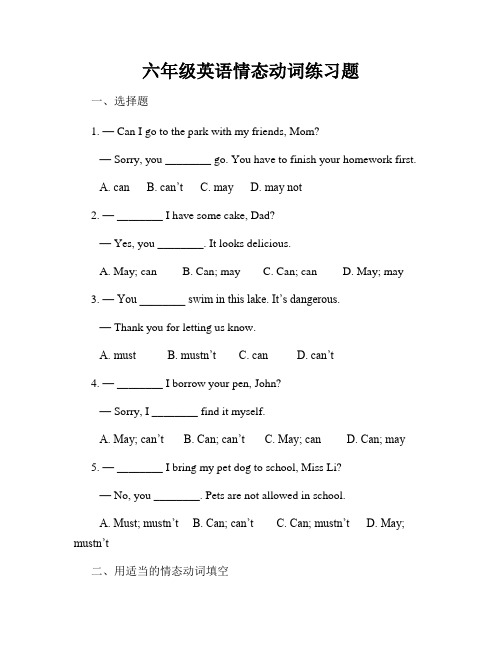
六年级英语情态动词练习题一、选择题1. — Can I go to the park with my friends, Mom?— Sorry, you ________ go. You have to finish your homework first.A. canB. can’tC. mayD. may not2. — ________ I have some cake, Dad?— Yes, you ________. It looks delicious.A. May; canB. Can; mayC. Can; canD. May; may3. —You ________ swim in this lake. It’s dangerous.— Thank you for letting us know.A. mustB. mustn’tC. canD. can’t4. — ________ I borrow your pen, John?— Sorry, I ________ find it myself.A. May; can’tB. Can; can’tC. May; canD. Can; may5. — ________ I bring my pet dog to school, Miss Li?— No, you ________. Pets are not allowed in school.A. Must; mustn’tB. Can; can’tC. Can; mustn’tD. May; mustn’t二、用适当的情态动词填空1. ________ you please help me carry this heavy box?2. Sam ________ play the piano when he was three years old.3. I ________ come to the party tomorrow. I have to study for my math test.4. Your brother ________ ride a bike, but he ________ drive a car.5. — ________ I use your computer?—Sorry, it’s not working right now.三、根据情景选择适当的选项完成对话A: Hello, may I speak to Mary, please?B: ________ (1)A: This is Lucy. I’d like to invite Mary to my birthday party this weekend.B: ________ (2) She has swimming lessons on weekends.A: How about next weekend?B: ________ (3) She is going camping with her family.A: That’s too bad. ________ (4)B: No problem. Have a great party!A: ________ (5)A. Is there any other day she is available?B. Can I leave a message for her?C. Can I take a message for her?D. Oh, I see. Thank you for letting me know.E. When will she be back?四、完形填空Dogs are very loving and loyal animals. They are often called man's best friend. They can be great __1__ and they can also be taught to help do many jobs. Dogs are __2__ used as guide dogs for people who are blind. These dogs help their owners get __3__. They learn how to take them places,__4__ (cross) streets safely and find things for them. Dogs have a very__5__ sense of smell. They can smell things that are far away or buried in the ground. That's why they are often used to __6__ missing people or to look for things. They have been used for this __7__ many years. Some dogs are also trained to help people who have trouble __8__ (walk). They can pull wheelchairs or help people get up if they have fallen down. In some countries, dogs are also used as police dogs to __9__ (catch) bad people. Dogs are wonderful animals. They are fun to have around and they can be very helpful as well.1. A. friends B. pets C. brothers D. parents2. A. often B. always C. never D. sometimes3. A. dressed B. dressed up C. dressed down D. dressed on4. A. conscious B. careful C. awake D. asleep5. A. sharp B. light C. heavy D. flat6. A. find B. see C. watch D. look7. A. way B. purpose C. direction D. sense8. A. walk B. walks C. walking D. walked9. A. get B. catch C. let D. leave答案:一、1-5 BDCDA二、1. Can 2. could 3. can't 4. can; can't 5. May; can't三、1-5 BAECD四、1-5 BACDA 6-9 ABCB。
六年级英语情态动词试题答案及解析
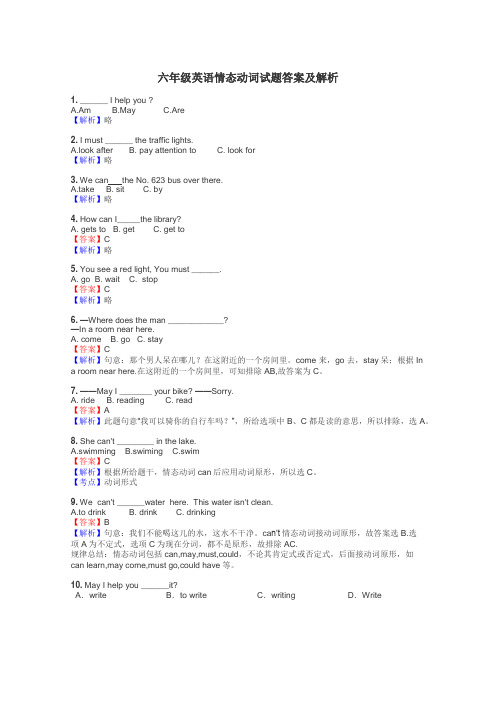
六年级英语情态动词试题答案及解析1. ______ I help you ?A.AmB.MayC.Are【解析】略2. I must ______ the traffic lights.A.look afterB. pay attention toC. look for【解析】略3. We can the No. 623 bus over there.A.takeB. sitC. by【解析】略4. How can I_____the library?A. gets toB. getC. get to【答案】C【解析】略5. You see a red light, You must ______.A. goB. waitC. stop【答案】C【解析】略6.—Where does the man ____________?—In a room near here.A. comeB. goC. stay【答案】C【解析】句意:那个男人呆在哪儿?在这附近的一个房间里。
come 来,go 去,stay呆;根据In a room near here.在这附近的一个房间里,可知排除AB,故答案为C。
7.——May I _______ your bike? ——Sorry.A. rideB. readingC. read【答案】A【解析】此题句意“我可以骑你的自行车吗?”,所给选项中B、C都是读的意思,所以排除,选A。
8. She can't ________ in the lake.A.swimmingB.swimingC.swim【答案】C【解析】根据所给题干,情态动词can后应用动词原形,所以选C。
【考点】动词形式9. We can't ______water here. This water isn't clean.A.to drinkB. drinkC. drinking【答案】B【解析】句意:我们不能喝这儿的水,这水不干净。
六年级英语情态动词专项练习题

奥瑞教育英语专项练习-情态动词小试牛刀(一)1.I am afraid that we _____give you an answer today. (can, can’t, mustn’t) 2.You_____be careful with fire when you have a picnic in the forest. It’s too dangerous.(can, need, must) 3.You_____come here so early tomorrow. (daren’t, shouldn’t, needn’t) 4.--- May I stand here? --- No, you_____. (may not, can’t,needn’t) 5.--- Must I clean the room today? --- No, you_____. (can’t,mustn’t ,don’t have to) 6.__you like to go shopping with me this weekend? (Will, Would,Do)7.The weather is so bad. You______stay at home. (used to, had better, would) 8.It’s too cold. _____I close the window?(shall, must,dare)小试牛刀(二)1.-- Look! That man looks like John.-- It ___be John, for he has gone to America.A.can’t B.mustn’t C.may not D.shouldn’t2.You___be tired after walking such a long way. Sit down and have a rest.A.can B.must C.should D.need3.She____ know the truth, but I’m not sure.A.maybe B.may be C.may D.must4.I’m afraid it____snow this afternoon.A.may be B.might C.can D.Must5. “____ you like to see a film?”“Yes, I’d like ____.”A will; to B. Would; to seeC. Would; toD. Will; to see6. “Must he do it?”“No, he ____.”A. mustn’tB. needn’tC. doesn’t have toD. B or C7. “Need you go now?”“Yes, I ____.” “No, I ____.”A. n eed; needn’tB. must; needn’tC. may; mustn’tD. can; needn’t8.“May I borrow your bike?”“No, you ____.”A. mustn’tB. may notC. had better notD. can’t9. “I think Helen is at home.”“No, she ____ be at home, for she phoned me from the airport just five minutes ago.”A. mustn’t B. needn’tC. can’tD. daren’t10. I missed the last bus, so I ____ go home on foot.A. mustB. have toC. mayD. had to11. He ____ get up early when he lived in the countryside.A. wouldB. used toC. mustn’tD. can’t12.Night has fallen. We have to go home, ____ we?A. don’tB. haven’tC. mustn’tD. shouldn’t13.“Will you lend me a hand?”“Yes, I ____.”A. willB. shallC. canD. may14. Let’s clean our room, ____?A. will youB. don’t weC. shall weD. do you15. Let us watch TV, ____?A. will youB. don’t weC. shall weD. do you16. Close the door after you, ____ you?A. don’tB. doC. shallD. will17.“____ you like to see a film?”“Yes, I’d like ____.”A will; to B. Would; to seeC. Would; toD. Will; to see18.Neither of them ____ the snake.A. dares catchB. dares to catchC. dare catchD. dare catching19. He ____ any help.A. needn’tB. doesn’t needC. needD. do need20. --- Where is Mary?--- She ____ in the library.A. should beB. must beC. can beD. must have been21. His room is dark. He must ____ to bed.A. goB. be goingC. have goneD. have been gone。
六年级英语上册语法复习课:情态动词

五、 will, would 1 ) 表示请求、建议等,would更委婉;
Will / Would you pass me the pen, please? 2 ) 表示意志、愿望和决心;
I will never do that again. 3) 表示估计和猜想;
It would be about 11 o’clock when he left home.
3. We will have an English party this Sunday. 变为否定句: _W_e__w_i_ll_n__o_t _h_a_v_e_a_n__E_n_g_l_is_h__p_a_r_ty__t_h_is__S_u_n_d_a_y. 对划线处提问: _W__h_a_t_w__il_l _y_o_u_d_o__t_h_is__S_u_n_d_a_y_?_____________
否定回答时可用can’t 或mustn’t, 表示“不可以,禁止”; — Might/ May I smoke in this room? — No, you mustn’t. — May/Might I take this book out of the room? — Yes, you can. (No, you can’t / mustn’t. ) 用May I...?征徇对方许可时比较正式和客气,而用Can I...? 在口语中更常见;
4. My friend can jump high. 变为否定句: __M__y_f_r_ie_n_d__c_a_n_n_o_t__ju_m__p__h_ig_h_._____________ 对划线处提问: _W__h__o_se__fr_i_e_n_d_c_a_n__j_u_m_p__h_i_g_h_?_____________
六年级情态动词练习题及答案
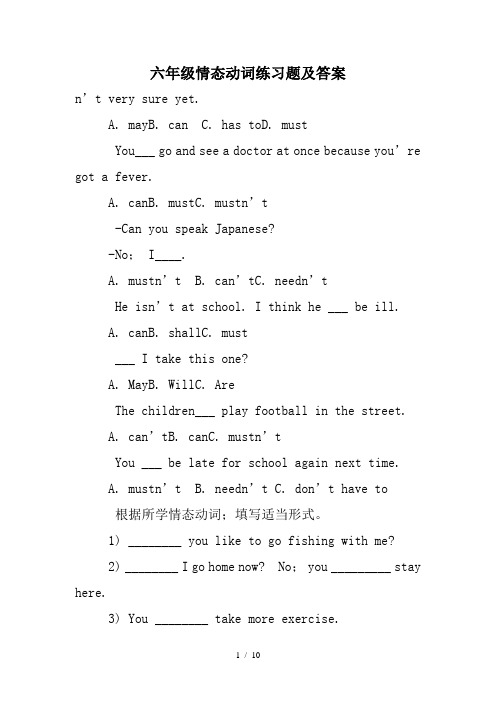
六年级情态动词练习题及答案n’t very sure yet.A. mayB. canC. has toD. mustYou___ go and see a doctor at once because you’re got a fever.A. canB. mustC. mustn’t-Can you speak Japanese?-No; I____.A. mustn’tB. can’tC. needn’tHe isn’t at school. I think he ___ be ill.A. canB. shallC. must___ I take this one?A. MayB. WillC. AreThe children___ play football in the street.A. can’tB. canC. mustn’tYou ___ be late for school again next time.A. mustn’tB. needn’tC. don’t have to根据所学情态动词;填写适当形式。
1) ________ you like to go fishing with me?2) ________ I go home now? No; you _________ stay here.3) You ________ take more exercise.4) The clock ________ tell us the time.5) ________ you tell me how to get to the Qingyun Park?6) My mother is ill. I _________ stay at home and look after her.7) ________ you like some tea?8) Must I borrow the book with my ID card?No; you ________.9) ________ I use your car?Yes; you ________.10) ________ we play football this afternoon?按要求改写句子。
小升初情态动词专项练习(试题)-英语六年级下册

小升初情态动词专项练习一、选择题1)Lily should her clothes.A. washB. washingC. washedD. washes 2)My sister would some songs for us.A. singsB. singingC. sangD. to sing 3)Would you me a red apple?A. givingB. givesC. givenD. give4)Shall we now?A. goB. goingC. goesD. to go5)you like a cup of coffee?A. WouldB. WillC. DoesD. Do6)- Must I speak English?- No, I .A. mustn'tB. needn’tC. couldn'tD. can’t 7)They see me on Sunday .A. mustB. mayC. shouldD. would8)I use your phone?A. MustB. MightC. MayD. should9)The girls play basketball in the classroom.A. shouldn’tB. couldC. mustD. mustn't 10)She Play the piano very well.A. canB. wouldC. mustn’tD. will11)Can I TV after dinner?A. watchB. watchesC. watchingD. watched 12)It is raining. I leave now.A. couldB. mustC. mayD. will13)He come to the party.A. may beB. wouldn’t likeC. mayD. not should 14)Excuse me, you tell me how to get to the nearest supermarket?A. couldB. mustC. shouldn’tD.have15)________ you like to go skating with me?A. mustB. wouldC. mayD. shall二、改写句子。
六年级(完整版)情态动词专题(练习题含答案)

六年级(完整版)情态动词专题(练习题含答案)一、选择题1.I ________ hear you clearly. Would you please repeat it?A.mustn’t B.can’t C.needn’t D.shouldn’t 2.Think twice before making a decision, or you __________ get into trouble.A.may B.can't C.shouldn't D.mustn't3.To avoid ________, we’d better ________ the parents’ meeting online.A.gather; hold B.gathering; hold C.gather; holding D.to gather; to hold 4.Hurry up, or we ________ miss the beginning of the film.A.should B.must C.may D.have to 5.—How do you like my new dress?—Well, if I ________ say, it is not suitable for you.A.may B.must C.have to D.should 6.—Why didn’t you tell it to me earlier?— Why ________ I? I want to have my own secret.A.can B.may C.should D.shall 7.—Mum, why do I have to wear a mask before entering the supermarket?—For your health and safety, you ________ be too careful.A.shouldn’t B.can’t C.mustn’t D.needn’t 8.—Hurry up, Jack! Let’s cross the road as fast as possible.—No, you ________. Don’t you see the light is still red?A.couldn’t B.wouldn’t C.m ustn’t D.needn’t 9.—Could I join you in the programme?—Sorry, you ________. You are too young.A.shouldn’t B.mustn’t C.can’t D.needn’t 10.You ________ write the report again because spelling mistakes are not allowed at all. A.must B.can C.may D.could11.—Is it really necessary for me to go shopping with a mask on?—I’m afraid you ________ in public. It is not only to protect yourself but also to protect others. A.must B.should C.can D.need 12.—Have you decided to take up teaching as career after graduation?—I ________ go abroad for further education instead. But it depends.A.must B.should C.may D.shall13.—The high school entrance examination is coming!—Yes, our teacher tells us we _______ be too careful while taking exams.A.mustn't B.shouldn't C.needn't D.can't14.We’ve discussed every detail of this plan and have got everything ready. But still something __________ go wrong. We still have to be very careful.A.must B.should C.would D.may 15.—Amy, I hear you've got many foreign coins._______ I have a look?—Of course, I'll fetch them for you.A.May B.MustC.Should D.Need16.You ______ pay too much attention to your pronunciation, as it is so important in the oral (口头的) test.A.shouldn’t B.mustn’t C.can’t D.needn’t17.My bike was broken yesterday,so I____walk home.A.might B.had to C.must D.could 18.—Ready? Let’s get started, Martin.— Swimming? I just ________ get used to it in winter.A.can’t B.needn’t C.mustn’t D.shouldn’t 19.Dr. Zhong Nanshan once said, "To prevent the spread of this disease, we________never be too careful."A.can B.may C.must D.should20.—Will my car be ready by the end of the day?—It ________ be, sir. I’ll call if there’s any problem.A.must B.could C.shall D.should 21.—The article says that a person’s animal sign decides his perso nality.—You ________ read it for fun, but don’t believe in that.A.can B.must C.shouldn’t D.needn’t 22.—Must I finish all my homework today, Mum?—No, you ________, my dear. You can finish some tomorrow if you like.A.needn’t B.shouldn’t C.can’t D.mustn’t23.Most young people like shopping online because they ________ spend much time going from shop to shop.A.needn’t B.can’t C.mustn’t D.shouldn’t 24.—In China, many parents complain that their children have to stay up late to do the homework.—Don’t worry. The government has realized the problem. I’m sure there ________ be good news soon.A.can B.should C.need D.must25.I think all the students love the weekends because, to them, they ________ get up early on Saturdays or Sundays.A.mustn’t B.don’t need C.needn’t D.can’t26.When people are waiting at the zebra crossing, cars and buses ________ wait and let them go first.A.must B.may C.can D.need27.—Shall I tell him the change of the time right now?—I’m afraid you ________, otherwise he will be late for t he meeting.A.can B.may C.must D.need28.—Will dad arrive home at 6 o’clock to have dinner with us this evening?— I think he will, but he ________ not. Sometimes he works extra hours.A.can B.must C.need D.may 29.—Who is singing next door? It sounds like a young girl’s voice.—It _________ be Jane. But she seldom sings English songs.A.need B.must C.may D.can 30.—Could you tell me how to renew the library books?—With pleasure. You ________ come to our desk every time. It’s easier to renew them online. A.can’t B.mustn’t C.needn’t D.shouldn’t 31.— Listen! Tom ________ be listening to the music while doing his homework.—Let’s go upstairs to remind him to turn it off.A.should B.could C.would D.must 32.—Mum, I bought some strawberries on my way home.—Oh, y ou’re so sweet. But the strawberries ________ be put into the fridge for freshness. A.must B.can C.may D.need33.—In China, many students have to stay up late to do their homework.—No worries. The government has realized the problem. I’m sure there ________ be good news soon.A.can B.should C.must D.need 34.—Who’s the man over there? Is that Mr. Black?—It ________ be him. Mr. Black is much taller than that man.A.may B.must C.can’t D.mustn’t 35.—________ I see your ID card? We have to check your personal information.—Sure. Here you are.A.May B.Need C.Should D.Must36.—I think they are enough. We ________ make so many chairs.—I don’t think so. Because nearly a quarter of them need ________.A.don’t need to; mending B.needed; to be mendedC.don’t need; mend D.need; to mend37.We teenagers ________ have dreams. With dreams and hard work, anything amazing________ be created.A.may; can B.might; should C.should; can D.must; has to 38.You ________ be careful with the camera. It costs!A.can B.will C.should D.may 39.—Who’s singing next door? Is it Miss Wang?—It ________ be her. She’s having the board meeting.A.can’t B.shouldn’t C.mustn’t D.needn’t 40.Sometimes smiles ________ be false, hiding other feelings like anger, fear or worry. A.should B.would C.must D.can【参考答案】一、选择题1.B解析:B【详解】句意:我听不清你说什么。
